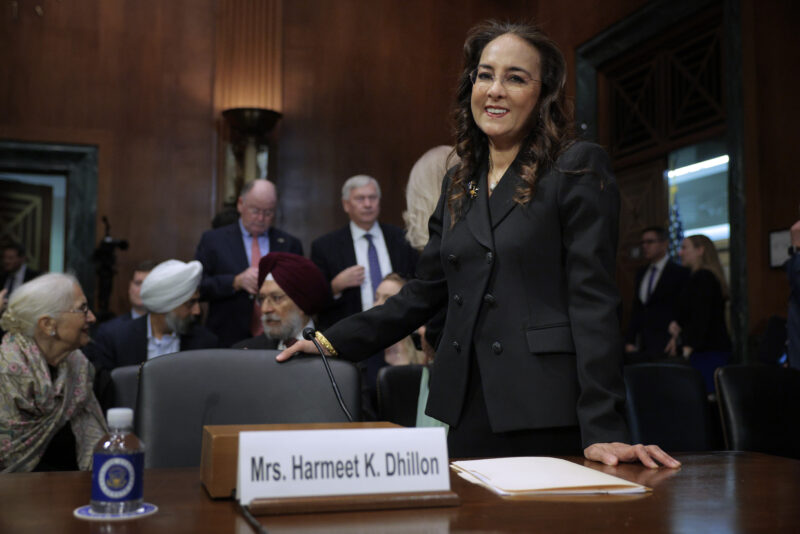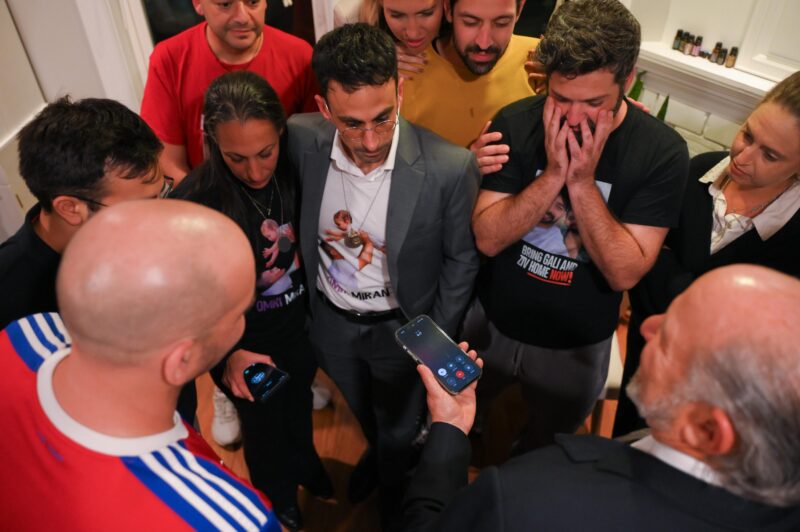The Michigan Democrat said that ‘a lot of young people’ who don’t know better are coming to college campuses and hearing and repeating antisemitic narratives

Chip Somodevilla/Sipa USA via AP
Rep. Elissa Slotkin (D-MI) questions witnesses during a hearing in the Rayburn House Office Building on Capitol Hill on September 17, 2020 in Washington, DC.
Sen. Elissa Slotkin (D-MI), speaking to a gathering of Jewish activists on Capitol Hill, highlighted concerns about rising left-wing antisemitism and the ways that antisemitic narratives are being spread to and by college students.
“We’re used to the right-wing side. What is new and what I think has so many in the Jewish community on our heels is that new left-wing antisemitism and how to approach it,” Slotkin said at a pre-High Holidays security briefing organized by several Jewish communal organizations. “How do we counteract it? How do we protect against it? How do we educate?”
“And certainly, we’re watching, on many college campuses, a lot of young people who actually maybe didn’t grow up with the Jewish community at all, get to campus and maybe repeat what they’re hearing, sometimes not even understanding or knowing,” she continued. “I would just say that one of our responsibilities as Jewish leaders and Jewish activists is to try and really parse through how to deal with antisemitism on the left, since antisemitism on the right isn’t good, but it’s more of a well-known threat.”
The freshman Michigan senator, who is working to establish herself as a leader in the chamber on national security issues, recently backed efforts to stop at least some offensive weapons shipments to Israel and emphasized that she hadn’t accepted endorsements from “Jewish group[s],” naming AIPAC and J Street.
Slotkin said at the Wednesday event that she “[doesn’t] think there’s been a more complicated and dicey time to be Jews in America, period, maybe since World War II.”
Speaking in support of the Nonprofit Security Grant Program, Slotkin said that one of the “most powerful moments that I had” during her time as a member of Congress was when a mosque in her district faced threats, and she worked with the local Jewish federation and her synagogue to help the mosque apply for an NSGP grant.
An emotional Sen. Amy Klobuchar (D-MN) referenced the killing of her friend, Minnesota House Speaker Melissa Hortman and her husband Mark, and the mass shooting at the Annunciation Church in Minneapolis as she discussed the rise of violent extremism across the country, including various incidents targeting the Jewish community.
“We have been through this each and every time, but the babies keep dying,” Klobuchar said.
Klobuchar said that in conversations with administration officials immediately after the Annunciation shooting, her top priority was pushing for increased NSGP funding, in addition to gun control measures and action to address extremism and incitement on social media platforms.
She highlighted that the Annunciation Church shooter had left a manifesto spreading hate against a range of targets including Jews, Muslims, Black people and Hispanic people, and emphasized that he and other mass shooters have been “performing for the internet.”
While she noted that data shows that political violence has been coming more from the right than the left, “I don’t want to go tit-for-tat. I care about what we’re doing now and going forward, and words matter right now for bringing America together,” Klobuchar said.
Speaking about threats to the Jewish community specifically, Klobuchar noted the rise in antisemitic hate crimes nationally, saying that “something is seriously wrong in our country.” She said that 25 Jewish facilities had received bomb threats in Minnesota in the past year.
“This has completely shattered people, kids are scared,” Klobuchar said.
Sen. Maggie Hassan (D-NH) said, referring to a string of recent antisemitic attacks, “I don’t care what fringe it comes from. This kind of extremism, hate and violence is unacceptable and needs to be condemned. … Foreign policy debates are complicated. Condemning antisemitism is not.”
She added that, as the generation that survived and witnessed the Holocaust shrinks, “we have to decide as a country if we will let their lessons pass.”
Hassan continued, “We can’t afford inaction. We can’t afford indifference, nor should we feel the need to offer qualification or apology, to simply say that the world’s oldest hate should be denounced as loudly as any other.”
Rep. Don Bacon (R-NE) also delivered remarks at the event, as did Rev. Russ McDougall, a member of the U.S. Conference of Catholic Bishops, who was invited in part to discuss the Annunciation Church attack. Sens. James Lankford (R-OK) and Jacky Rosen (D-NV) delivered video remarks.
The session also featured a panel with Jewish Federations of North America CEO Eric Fingerhut, Conference of Presidents of Major American Jewish Organizations CEO William Daroff, Secure Communities Network CEO Michael Masters, Orthodox Union Executive Vice President Moshe Hauer and Anti-Defamation League director of government relations Carmiel Arbit.
Fingerhut told Jewish Insider there is “a domestic terror crisis” in the country “and we need comprehensive, strong action.”
“[Members of Congress] didn’t create the COVID problem either, but they responded with a crisis-level response, and that’s the level of response we need,” Fingerhut said.
He emphasized the need not only for increased NSGP funding but stronger funding for local law enforcement, the FBI and the Department of Homeland Security to fight domestic terrorism. He said that resourcing and funding at those agencies for the counterterrorism mission isn’t sufficient.
“We’re in an era now of a trillion-dollar defense budget that is aimed at fighting terror and protecting America all over the world,” Fingerhut said. “We have a domestic terror crisis here, and it needs the level of attention and coordinated leadership by the federal government that we get in national defense.”
Michigan Senate candidate Mallory McMorrow also voiced support for cutting off offensive weapons to Israel

Paul Sancya/Pool/Getty Images
Sen. Elissa Slotkin (D-MI) rehearses the Democratic response to President Donald Trump's address to a joint session of Congress.
Sen. Elissa Slotkin (D-MI) said Thursday that she supported two resolutions led by Sen. Bernie Sanders (I-VT) to cut off shipments of assault rifles and bombs and bomb guidance kits to Israel, in a pivot from her previous stances.
Slotkin missed the votes on the resolutions which occurred Wednesday, having spent part of the day taping an episode of “The Late Show with Steven Colbert.” Slotkin’s support brings the total number of Democrats supporting the two resolutions to 28 and 25, respectively. Michigan state Sen. Mallory McMorrow, a potential future colleague of Slotkin in Michigan’s Senate delegation, also voiced support Wednesday for cutting off offensive weapons to Israel.
“I have struggled with this Joint Resolution of Disapproval more than any previous votes in the nearly two years since Hamas initiated the attacks of October 7,” Slotkin said in a statement. “Had I made it back for the vote yesterday, I would have voted yes to block offensive weapons to Israel based on my concerns over lack of food and medicine getting to civilians in Gaza.”
She said she remains a “strong supporter of the Jewish State of Israel … But despite the fact that Hamas began this bloody round of conflict — and refuses to release the hostages — the images of emaciated children are hard to turn away from. As are the calls from Michiganders who have friends and family trying to survive in Gaza.”
The senator called the resolution votes “a bad way to do foreign policy” and said that it’s the role of the executive branch to set foreign policy and negotiate with other countries, but that the Israeli government believes “there are no limits to what they can do while still receiving U.S. support. And so, I believe a message has to be sent.”
She said her support for future similar resolutions would be determined “on a case-by-case basis,” pending changes to the humanitarian situation. She said she “continue[s] to support the U.S.-Israel security relationship” and defensive weapons sales including missile defense systems.
“While the leaders of Hamas deserve what they’re getting in response to October 7, and Israel — like any other country in the world — has the right to defend itself, that doesn’t include letting children go hungry,” Slotkin continued in the statement. “That is despite Hamas’ sick refusal to relent, prevent further destruction, negotiate in good faith and release the hostages.”
She also argued that Israeli Prime Minister Benjamin Netanyahu’s actions endanger Israel because they “threaten the longstanding bipartisan consensus that have helped keep Israel safe since its inception,” describing her position as one based on “deep concern and conviction for Israel’s long-term security” and the threats Israel has faced since the day it was founded.
McMorrow, a Democratic Senate candidate running for the seat of retiring Sen. Gary Peters (D-MI), said on the campaign trail on Wednesday that she supports stopping offensive weapons transfers to Israel.
“The United States has to stop providing Netanyahu with offensive weapons that do nothing but continue to extend this war,” she said.
McMorrow said that the humanitarian crisis in Gaza is “indefensible” and that “we cannot let [Netanyahu] tell us that what we are seeing with our own eyes is not what is actually happening.”
She also demanded that Hamas release all of the hostages and disarm and that the parties must reach a permanent ceasefire.
“It feels like we’ve lost the humanity in this issue and what is true is that Palestinians deserve security and peace. Israelis deserve security and peace,” McMorrow said. “And the United States, as the most powerful nation in the world, has to do everything in our power and our influence to make it all happen.”
The other Democratic candidates in the race, Rep. Haley Stevens (D-MI), a longtime vocal supporter of Israel, and Abdul El-Sayed, an Israel critic, haven’t responded to requests for comment on the prospect of blocking offensive weapons sales to Israel.
The two other Senate Democrats who missed Wednesday’s votes, Mark Kelly (D-AZ) and Ruben Gallego (D-AZ), both said they would have voted against both resolutions.
Slotkin, in an appearance on an anti-Israel podcast: ‘I was the first Jew elected to the Senate that was not endorsed by any Jewish group — AIPAC, J Street’

Paul Sancya/Pool/Getty Images
Sen. Elissa Slotkin (D-MI) rehearses the Democratic response to President Donald Trump's address to a joint session of Congress.
Sen. Elissa Slotkin (D-MI) indicated in an interview on the “Breaking Points” podcast on Tuesday that she’s open to considering cutting off offensive weapons sales to Israel — comments that came a day before the Senate is set to vote on blocking two arms sales to Israel — as well as distanced herself from “Jewish group[s]” like AIPAC and J Street.
At the same time, while offering criticisms of Israel and its operations in Gaza, Slotkin refused to embrace and pushed back on some of the more heated anti-Israel rhetoric offered by the podcast’s hosts. The podcast, which brings together a progressive and a libertarian host, generally takes an isolationist view toward U.S. foreign policy and is opposed to the close U.S.-Israel relationship.
Asked about cutting off offensive aid, Slokin said, “That certainly, to me, would be a place to look, but I’m not going to cut off a blanket next sale on a defensive weapon that comes through, no.”
One of the hosts, the progressive Krystal Ball, pressed Slotkin over the distinction between offensive and defensive systems, arguing that the U.S. does not provide defensive weapons systems to Russia or Iran — malign global actors and longstanding adversaries.
Slotkin responded by noting her support for the U.S.-Israel relationship in the long term, and argued allies should be treated differently than adversaries even in times of disagreement between the two countries.
“Sometimes we have big breaks with allies, right? Sometimes we have difficult moments with allies. Sometimes it goes the wrong way with allies. But an allied relationship is a long-term relationship,” Slotkin told the duo.
“I think about this from the mirror image way because I do not support the things that Donald Trump is doing, right? But I’m an American. So, do I want other countries to look at America and be like, ‘We can’t stand Donald Trump so we’re going to end the long-standing relationship we have with the American people. We’re going to cut off any support we give them on information sharing or intelligence sharing,’” she continued.
Slotkin also distanced herself from “Jewish group[s],” mentioning that she’d declined to seek endorsements from AIPAC and J Street specifically.
Asked if AIPAC should be forced to register as a foreign lobbying organization, Slotkin said she did not have an answer beyond that she knew “plenty of people who think they should” but would “have to look at the definition.”
Accusations from both political fringes that AIPAC — whose members are American citizens — constitutes a foreign influence operation, have often invoked antisemitic dual loyalty tropes.
After being accused of providing a “cop-out answer,” Slotkin replied by saying that she had stopped accepting money from the group over disagreements about policy and overall strategy in 2021, after having support from AIPAC members when she first ran for Congress in 2018. The group did not officially endorse or fundraise for candidates until the 2022 election cycle.
“You’ve got to get your facts straight. I have not been endorsed by AIPAC. I have not, I’m sorry. I was the first Jew elected to the Senate that was not endorsed by any Jewish group — AIPAC, J Street. In 2018, when I first ran [I was endorsed by] people who were [AIPAC] members, yes, but I’ve not been endorsed since then,” Slotkin said. “And I’ve just got to be honest, like I think that this is where facts really matter. I’ve had very, very difficult conversations with my colleagues in that organization and made a choice back in 2021.”
“2021, so that was the first time I was up for reelection. So I understand that there’s a sort of like, again, cornered position, but to me like I call balls and strikes as someone who served in the Middle East,” she added.
Slotkin was endorsed by one Jewish group, the Jewish Democratic Council of America, which maintains a pro-Israel stance, in 2024.
Slotkin, pressed by Ball on the humanitarian situation in Gaza, said she had signed onto a letter accusing Israel of pursuing a “policy of starvation,” adding that, as an “occupying power,” it has a responsibility to ensure food is supplied to Gaza. But she stopped short of endorsing Ball’s framing of Israel’s actions as a “crime against humanity.”
She also did not embrace Ball’s claims that Israel is pursuing “ethnic cleansing” in Gaza, while criticizing plans from the Israeli government for relocating people within or out of Gaza as illegal.
“I’ve been clear about that,” Slotkin said. “So I would ask for a little bit of an open mind.”
Ball responded by accusing Slotkin of failing to take meaningful action on the issue and criticizing her for voting for aid to Israel, for the Antisemitism Awareness Act, for legislation describing anti-Zionism as antisemitic and for sanctioning the International Criminal Court.
Ball told the Michigan senator that her progressive positions on domestic issues like health care and housing policy were irrelevant to her if she was “still supporting a genocide in Gaza.”
“I’m speaking for myself, but I know there are millions of other people who feel the same, that you have to at least cross this sort of moral threshold,” Ball said.
While Ball framed the conflict in the Middle East as a central issue in the New York City mayoral race, Slotkin, looking to her own senatorial race in 2024, argued that its political significance has been overplayed.
“This issue is motivating people in a very visceral and personal way. But it’s not the only issue that my voters in Michigan care about,” she said. “The online world is extremely, extremely focused on this, but that doesn’t always represent the majority.”
She said it’s the top issue in some areas, but outside of the Detroit area, “it’s not in the top 40.”
Slotkin also said she was proud that she had won a majority of both Jewish voters and the three cities with the largest Muslim populations in Michigan during her Senate campaign, which she attributed to “calling balls and strikes” and leaning on her background in Middle East policy.
The Michigan senator also appeared to argue that the pace of anti-Israel protests has dropped off significantly since the end of the Biden administration
“I just think it’s interesting that there were a ton of protests when Democrats were in charge” against the war in Gaza, adding that it’s “fair to say, just to be honest, that … the number of protests that go on now, versus before,” though she was cut off by the show’s hosts.
She generally declined to weigh in on the results of the New York City mayoral race, saying primarily that she believes the results reflect concerns about the cost of living and the need for a new generation of leadership.
“I can have plenty of disagreements with what I’ve heard Mr. [Zohran] Mamdani propose, and I do,” she said. “I am here because we lived the American dream through capitalism. A lot of free stuff to me is not the answer. … But I can have those disagreements. I would be thrilled to have that conversation with him or anyone else.”
Asked about her condemnation of Rep. Rashida Tlaib (D-MI) for using the phrase “from the river to the sea,” and if she would also condemn Rep. Randy Fine (R-FL) for his comments saying Gazans should “starve away,” Slotkin said she did not know who Fine was but had no reservations denouncing such remarks.
“I have no problem condemning Randy Fine, who I don’t know. I don’t, I’m sorry. I don’t know who that person is. I have no problem condemning someone who talks like that,” she told the hosts.
Slotkin was also asked if she believed that financier and convicted pedophile Jeffrey Epstein “had any connections to U.S. or Israeli intelligence agencies.” Slotkin, a former CIA analyst, said she would be “very surprised” if that was the case.
Sens. Adam Schiff, Andy Kim and Tim Kaine announced plans to introduce an amendment to ensure that the U.S. can continue to share intelligence with Israel and to assist Israel’s defense

Drew Angerer/Getty Images
Sen. Tim Kaine (D-VA) speaks to reporters on his way to a classified all-Senate briefing
A Senate war powers resolution aiming to block further U.S. military action against Iran appears to be building and solidifying support among Democrats ahead of an anticipated vote later this week.
Sens. Adam Schiff (D-CA), Andy Kim (D-NJ) and Tim Kaine (D-VA) announced on Tuesday they planned to introduce an amendment to Kaine’s resolution to specifically ensure that the U.S. can continue to share intelligence with Israel and to assist Israel’s defense and provide it with defensive equipment to counter attacks by Iran and its proxies.
A House resolution on the issue had prompted private divisions among Democrats earlier this week over a similar issue, with many lawmakers concerned that the resolution would prevent the U.S. from continuing to support Israeli missile defense, a Democratic staffer not authorized to speak publicly told JI.
The senators said in a statement they expect the full Senate will vote on the amendment prior to a final vote on Kaine’s resolution. They argued that the amendment makes clear to Iran that the U.S. will continue to defend Israel.
Kaine said that the ceasefire between the U.S. and Iran announced Monday night doesn’t change the necessity of the vote, and “actually gives you the space to actually have a decision about, prospectively, should we be at war with Iran without a vote of Congress.”
Asked by Jewish Insider whether he still anticipates that most or all other Democrats will still support the resolution, Kaine said, “They believe we should not be at war without a vote of Congress. They may have different points where a war would be the right thing to do, but that should not happen without a vote of Congress.”
He said he still expects to have multiple Republicans supporting the resolution, but the number is unknown. Only Sen. Rand Paul (R-KY) has publicly voiced support.
Sen. Mark Kelly (D-AZ), asked about the resolution, said that there was not a “clear and imminent threat to the United States, to our citizens” and the administration “should have come to us and talked about this,” as it did prior to Operation Desert Storm, in which he served.
“You’ve got a goal, you talk to Congress about it. You get the force ready to do this. You talk to the adversary and you say, ‘Here are our options: Get out of Kuwait or we’re going to kick you out,’” Kelly said. “That occurred with a full, transparent discussion with the United States Congress, per the Constitution.”
Kelly reviewed a classified Defense Intelligence Agency assessment indicating the U.S. strikes had a limited effect on Iran’s nuclear program, and said that the situation shows the “recklessness of just rushing forward when you don’t have the follow-on plan, and you don’t really consider the consequence.”
He said the strikes were risky because Iran may now take its program completely covert and race to a nuclear weapon. “This has been my concern since the second this happened. Does this push them forward?” Kelly said.
Sen. John Hickenlooper (D-CO) said he hadn’t looked at the resolution but said “it seems like we had lots of time to be consulted.”
Sen. Elissa Slotkin (D-MI) said she’s still examining the resolution but emphasized that she led legislation in 2020 to block military action against Iran following the killing of Quds Force head Gen. Qassem Soleimani.
Sen. Ted Cruz (R-TX) on Tuesday proposed another amendment to Kaine’s resolution, commending President Donald Trump for a “successful mission” in damaging the regime’s nuclear program.
Jordan Acker's law office in Southfield vandalized: 'I believe this was a message to be sent to the Jewish community'

Courtesy Jordan Acker
Vandals scrawled antisemitic and anti-Israel messages early Monday morning at the law office of University of Michigan regent Jordan Acker in Southfield, a heavily Jewish suburb of Detroit.
The exterior of University of Michigan Board of Regents member Jordan Acker’s law office was vandalized overnight on Monday with the phrases “FREE PALESTINE,” “DIVEST NOW,” “FUCK YOU ACKER” and “UM KILLS” scrawled on the walls, walkway and front window. The incident is the second time during the Israel-Hamas war that Acker, who is Jewish, has been targeted by anti-Israel demonstrators.
“It’s a disgusting escalation and pure antisemitism,” Acker, who is a former Obama administration official and has sat on the school’s Board of Regents since 2018, told Jewish Insider. “This has nothing to do with Palestine. I am one of eight [regents] and I was the only person targeted. I believe that’s because I’m Jewish. I believe this was a message to be sent to the Jewish community.”
According to video footage obtained by the Goodman Acker personal injury law firm, which is located in a heavily Orthodox Jewish neighborhood of Southfield — about 30 minutes away from the University of Michigan campus in Ann Arbor — the incident occurred at approximately 2 a.m. when four masked individuals splattered the front walkway, the sign over the door and the building’s walls with red and black spray paint and the antisemitic and anti-Israel messages.
Southfield police told local newspaper Deadline Detroit that the department responded to a 911 call Monday morning and is investigating the matter. “The investigation is in its infancy,” Lt. Mo Bzeih said. “We want to gather the preliminary facts before we put out a statement. We’re canvassing the area.”
“The vandalism that occurred at Regent Jordan Acker’s place of business is shocking and unacceptable,” University of Michigan’s president, Santa Ono, said in a statement. “Singling out this dedicated public servant and defacing his workplace in the middle of the night is an act of antisemitic cowardice that Southfield police have indicated is being investigated as a hate crime. Such harassment and attempts to intimidate have no place in a civil society and certainly no place in our university community.”
Many Michigan lawmakers and candidates for office expressed support for Acker and condemned the incident. Republican Senate candidate and former Rep. Mike Rogers (R-MI) tagged the incident as antisemitic, while his Democratic opponent, Rep. Elissa Slotkin (D-MI) called it “intimidation related to the Middle East conflict.”
“We have yet another instance of the use of intimidation related to the Middle East conflict. If your ‘protest’ tactics include vandalism and violent language, you’re not protesting — you’re breaking the law and discrediting your cause at the same time,” Slotkin said in a statement. “And anyone carrying that out should be held legally accountable.”
Rep. Debbie Dingell (D-MI) said in a statement to JI, “Vandalism and acts of violence and hate against anyone for any reason are completely unacceptable. I condemn these actions in the strongest terms. Hate is being normalized in too many communities, and we must stand up to hate wherever and whenever we see it.”
Rep. Haley Stevens (D-MI) wrote on X, “Jordan Acker and the Goodman Acker law firm have my love and support… so many drive by his place of work every day and it’s painful to see this attack on a place of business. Today and everyday, I denounce Jewish hate with every fiber in my being.”
Sen. Gary Peters (D-MI) told JI in a statement, “I condemn today’s antisemitic attack on University of Michigan Regent Jordan Acker’s Office in Southfield. While everyone has a right to express their views, there is absolutely no place for vandalism or violent rhetoric of any kind of in our state. It’s up to all of us to call out these attacks targeting Michiganders for who they are or their religion.”
Last month, as Acker, his wife and three daughters were asleep, his doorbell app obtained footage of a stranger wearing a red keffiyeh over his face walking up to the family’s front door. He stood there for several moments, placed papers on the door and took photographs before leaving. The incident occurred in the wake of University of Michigan police breaking up an anti-Israel illegal encampment on the Diag, the main quad, that engulfed the campus for nearly a month. One of the papers, a list of demands for the leadership of the University of Michigan, was signed: “In liberation, the UMich Gaza Solidarity Encampment.”
Jewish Insider congressional correspondent Emily Jacobs and senior national correspondent Gabby Deutch contributed reporting.
Bipartisan letter argued that not removing the presidents from their positions would constitute an ‘endorsement’ and ‘act of complicity’ in the presidents’ ‘antisemitic posture’

Kevin Dietsch/Getty Images
Claudine Gay, president of Harvard University and Liz Magill, president of University of Pennsylvania, testify before the House Education and Workforce Committee at the Rayburn House Office Building on December 05, 2023, in Washington, D.C.
Seventy-four House lawmakers wrote to the boards of Harvard, the Massachusetts Institute of Technology and the University of Pennsylvania on Friday demanding that they immediately fire their presidents in response to widely criticized congressional testimony they delivered on antisemitism on their campuses earlier this week.
The presidents of the three schools have come under increasing scrutiny this week amid growing speculation that their jobs could be on the line following their refusal to say earlier this week that calls for Jewish genocide would violate their schools’ codes of conduct.
“Testimony provided by presidents of your institutions showed a complete absence of moral clarity and illuminated the problematic double standards and dehumanization of the Jewish communities that your university presidents enabled,” the letter reads. “Given this moment of crisis, we demand that your boards immediately remove each of these presidents from their positions and that you provide an actionable plan” to ensure the safety of the Jewish community on campus.
“Anything less,” than the steps they requested, the lawmakers continued, “will be seen as your endorsement… and an act of complicity in their antisemitic posture.”
The letter was led by Rep. Elise Stefanik (R-NY), who questioned the presidents on the genocide issue, and Rep. Jared Moskowitz (D-FL). Rep. Josh Gottheimer (D-NJ) is the only other Democrat who signed the letter; the rest are Republicans.
The lawmakers said that the testimony makes it “hard to imagine” any Jewish or Israeli person feeling safe on their campuses when the presidents “could not say that calls for the genocide of Jews would have clear consequences on your campus.”
It adds that subsequent social media statements seeking to clarify or walk back those comments “offered little clarification on your campus’ true commitment to protecting vulnerable students in this moment of crisis,” describing them instead as “desperate attempts to try and save their jobs” and “too little too late.”
Shortly before the Stefanik-Moskowitz letter was released, a group of thirteen House Democrats wrote to the boards of the three schools urging them to re-examine their codes of conduct to make clear that calls for the genocide of Jews are not acceptable.
This second letter, led by Reps. Kathy Manning (D-NC), Jake Auchincloss (D-MA) and Susan Wild (D-PA), includes similar language to the bipartisan letter regarding the presidents’ testimony and how it would make Jewish campus members feel unsafe, but stops short of directly calling for the presidents to be fired.
The lawmakers wrote that they felt “compelled to ask” if the presidents’ responses “align with the values and policies of your respective institutions.”
“The presidents’ unwillingness to answer questions clearly or fully acknowledge appalling and unacceptable behavior — behavior that would not have been tolerated against other groups — illuminated the problematic double standards and dehumanization of the Jewish communities at your universities,” the letter continues. “The lack of moral clarity these presidents displayed is simply unacceptable.”
The lawmakers requested that the schools update their policies to “ensure that they protect students from hate” and describe their plans for protecting Jewish and Israeli community members.
“There is no context in which calls for the genocide of Jews is acceptable rhetoric,” the letter reads. “While Harvard and Penn subsequently issued clarifying statements which were appreciated, their failure to unequivocally condemn calls for the systematic murder of Jews during the public hearing is deeply alarming and stands in stark contrast to the principles we expect leaders of top academic institutions to uphold.”
The letter notes that federal civil rights law prohibits discrimination against Jews on campus, and that criminal law bans hate crimes, violence and incitement to violence.
“Students and faculty who threaten, harass, or incite violence towards Jews must be held accountable for their actions,” the lawmakers wrote. “If calls for genocide of the Jewish people are not in violation of your universities’ policies, then it is time for you to reexamine your policies and codes of conduct.”
Signatories to the Democratic letter include Manning, Wild, Auchincloss, Debbie Wasserman Schultz (D-FL), Lois Frankel (D-FL), Haley Stevens (D-MI), Greg Landsman (D-OH), Grace Meng (D-NY), Brad Schneider (D-IL), Dan Goldman (D-NY), Donald Norcross (D-NJ), Jerry Nadler (D-NY) and Elissa Slotkin (D-MI).
All of the signatories to the Democratic letter are either Jewish or deeply involved with Jewish community issues on the Hill.
Earlier this week, a third letter by six House Republicans from Pennsylvania — Reps. Guy Reschenthaler (R-PA), alongside Congressmen John Joyce, M.D. (R-PA), Mike Kelly (R-PA), Lloyd Smucker (R-PA), Brian Fitzpatrick (R-PA), and Dan Meuser (R-PA) — called for University of Pennsylvania President Liz Magill specifically to be fired.














































































